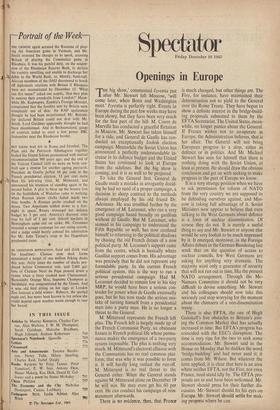Openings in Europe
THE big show,' commented Izvestia just after Mr. Stewart left Moscow, 'will come later, when Bonn and Washington meet.' hvestia is perfectly right. Events in Europe during the past few weeks may have been showy, but they have been very much for the first part of the bill. M. Couve de Murville has conducted a graceful flirtation in Moscow, Mr. Stewart has taken himself for a ride, and General de Gaulle has con- ducted an exceptionally foolish election campaign. Meanwhile the Soviet Union has announced a perfectly understandable in- crease in its defence budget and the United States has continued to look at Europe from the sidelines. But the big show is coming, and it is as well to be prepared. To take the General first. General de Gaulle made a mistake in arrogantly decid- ing he had no need of a proper campaign, a decision in sharp contrast to the methods always employed by his old friend Dr. Adenauer. He was troubled further by the emergence of M. Lecanuet, who ran a very good campaign based broadly on gaullism without de Gaulle. But M. Lecanuet, who seemed in his campaign to understand the Fifth Republic so well, has now confined himself to returning to the political shadows by chasing the old French dream of a new political party. M. Lecanuet's support came from the centre, which is basically where Gaullist support comes from. His advantage was precisely that he did not represent any formidable party. In the current French political system, this is the way to run a serious presidential campaign. Had M. Lecanuet decided to remain low in his tiny MRP, he would have been a serious con- tender for power when de Gaulle eventually goes, but he has now made the serious mis- take of turning himself from a presidential man into a party man. He is no longer a threat to the General.
M. Mitterand represents the French left plus. The French left is largely made up of the French Communist Party, an obstinate fixture in French political life whose perma- nance makes the emergence of a two-party system impossible. The plus is nothing very much. M. Mitterand's electoral alliance with the Communists has no real common plat- form; that was why it was possible to form it. It will hardly long outlast the run-off. M. Mitterand is no real threat to the General either. When the General stands against M. Mitterand alone on December 19 he, will win. He may even get his 60 per cent. He can conduct his campaign of rein- statement afterwards.
There is no evidence, then, that France is much changed, but other things are. The Five, for instance, have maintained their determination not to yield to the General over the Rome Treaty. They have begun to show a definite interest in the bridge-build- ing proposals submitted to them by the EFTA Secretariat. The United States, mean- while, no longer panics about the General. If France wishes not to co-operate in Europe, the Administration believes, that is her affair. The General will not bring European progress to a stop, either in defence or in politics. And Mr. Michael Stewart has seen for himself that there is nothing doing with the Soviet Union, at least at present. He should draw the obvious conclusion and get on with seeking to make progress in the part of Europe we know.
It is a very strange position when we have to ask permission for reform of NATO from the very country we are supposed to be defending ourselves against, and Mos- cow is taking full advantage of it. Soviet Ministers now appear to believe that even talking to the West Germans about defence is a, form of nuclear dissemination. Of course they do not. It is merely a useful thing to say and Mr. Stewart or anyone else would be very foolish to be much impressed by it. It emerged, moeeover, in the Foreign Affairs debate in the German Bundestag last week that on the question of access to nuclear councils, few 'West Germans are asking for anything very dramatic. The majority want only a guarantee of security that will not run out in time, like the present NATO arrangement. Through the Mc- Namara Committee it should not be very difficult to devise something. Mr. Stewart and his colleagues should now take this seriously and stop worrying for the moment about the chimaera of a non-dissemination treaty.
There is also EFTA, the one of Hugh Gaitskell's five obstacles to Britain's join- ing the Common Market that has actually increased in time. But EFTA's progress has coincided with the EEC's disruption. The time is very ripe for the two to seek some accommodation. Mr. Stewart said in the House on Monday that he dislikes the word `bridge-building' and had never used it; it comes from Mr. Wilson. But whatever the term applied, it is clear that here is an area where neither EFTA, nor the Five, nor even France, need stand idly by. The EFTA pro- posals are in and have been welcomed. Mr. Stewart should press for their further dis- cussion. Mr.-Stewart should fix his eyes on Europe. Mr. Stewart should settle for mak- ing progress where he can.






































 Previous page
Previous page